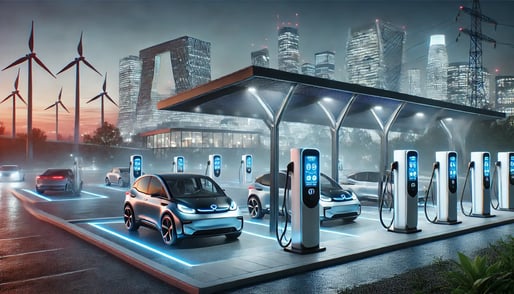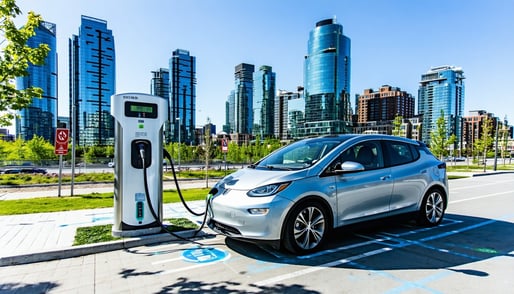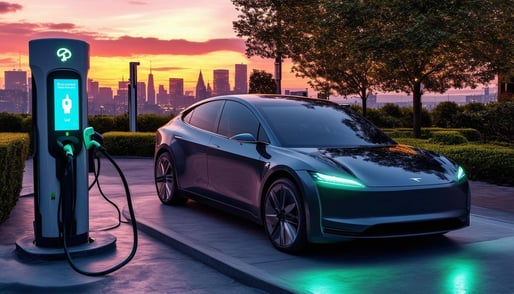Stay ahead by understanding the current regulations and incentives for EV charging infrastructure in British Columbia.
As electric vehicles (EVs) become more prevalent in British Columbia, developers and property managers must navigate the evolving regulatory landscape. Integrating EV charging infrastructure is not only a compliance matter but also a strategic move to enhance property value and meet market demand.
Why EV Charging Matters for Developers and Property Managers
- Growing EV Adoption: British Columbia leads Canada in EV adoption, with over 23% of new vehicle sales being electric as of 2023.
- Market Demand: Homebuyers, tenants, and commercial clients increasingly expect EV charging capabilities.
- Regulatory Compliance: Understanding regulations is essential to avoid penalties and capitalize on incentives.
Current Regulations in British Columbia
BC Building Code Amendments
Mandatory EV Infrastructure in New Developments:
- Residential Buildings: The BC Building Code mandates that all new residential buildings, including single-family homes, townhouses, apartments, and condos, be 100% EV-ready. This requires an energized outlet capable of providing Level 2 charging at each parking space.
- Commercial Buildings: While the provincial code does not currently mandate EV infrastructure in all new commercial buildings, many municipalities have bylaws that do.
Strata Property Regulations
- New Strata Property Regulations: On December 6, 2023, the BC government enacted new regulations under the Electric Vehicle Charging and Electric Management Regulation as part of Bill 22: the Strata Property Amendment Act. These changes simplify the installation of EV charging infrastructure in strata properties. Learn more
- Strata corporations can now approve some EV charging decisions by a majority vote instead of a 3/4 vote, simplifying the decision-making process.
- Strata corporations cannot unreasonably refuse an owner's request to install an EV charging station if certain conditions are met. Read more
- Strata corporations can grant exclusive use of a common property parking stall for up to 5 years if an owner installs and pays for EV charging in that stall.
Electrical Planning Report (EPR) Requirements
- Electrical Planning Reports (EPR): Strata corporations with five or more units are now required to obtain an EPR to assess their building's electrical capacity and plan for future EV charging needs.
- EPR Deadlines:
- Late 2026: Stratas in Metro Vancouver, Fraser Valley, and Capital Regional Districts
- Late 2028: Stratas in other provincial areas
- Exempt: Small strata communities with fewer than five units
- The EPR must include information on current building electrical capacity, peak demand, spare capacity, and anticipated electricity demand. Read more
- EPR Deadlines:
Municipal Bylaws and Requirements
- City of Vancouver:
- Residential Developments: Requires 100% EV-ready parking stalls in new multi-family residential buildings.
- Commercial Developments: Mandates that 10% of parking spaces be EV-ready.
- City of Richmond:
- Residential: Requires 100% EV-ready stalls in new residential developments.
- Commercial: Requires 20% of parking spaces in new commercial buildings to be EV-ready.
- District of North Vancouver:
- Updated Bylaws: The District of North Vancouver recently updated its policies to require new residential developments, including single-family homes and multi-family buildings, to have 100% of parking stalls EV-ready. Additionally, new commercial and mixed-use buildings are required to include at least 20% of parking spaces with EV charging infrastructure. This update reflects the district's commitment to supporting EV adoption and ensuring that new developments are future-proofed for the growing demand for electric vehicles. Read more
- Updated Bylaws: The District of North Vancouver recently updated its policies to require new residential developments, including single-family homes and multi-family buildings, to have 100% of parking stalls EV-ready. Additionally, new commercial and mixed-use buildings are required to include at least 20% of parking spaces with EV charging infrastructure. This update reflects the district's commitment to supporting EV adoption and ensuring that new developments are future-proofed for the growing demand for electric vehicles. Read more
- Other Municipalities: Cities like Burnaby, Surrey, and Victoria have similar or evolving requirements. Developers should consult local bylaws during the planning stages. Learn more about BC Municipal Policies
- Municipal Regulations: Several municipalities have unique EV charging requirements:
- Abbotsford: New residential developments must have raceways or conduit capable of providing Level 2 charging for all required parking spaces.
- Burnaby: Since 2018, all parking spaces for dwelling units in new residential developments must include an energized outlet capable of Level 2 charging. More details
- Esquimalt: Requires a minimum of one Level 2 charging outlet per parking space in multi-unit residential buildings.
Zero-Emission Vehicles Act (ZEVA)
Provincial Targets:
- 100% of new light-duty vehicles sold in BC must be zero-emission by 2035.
Impact on Development:
- Anticipate increased demand for EV charging in both residential and commercial properties. Learn more about ZEVA
Upcoming Regulations to Monitor
- BC Energy Step Code Integration:
- Potential alignment of EV infrastructure requirements with energy efficiency standards.
- Potential alignment of EV infrastructure requirements with energy efficiency standards.
- Expanded Commercial Mandates:
- Possible introduction of province-wide requirements for EV-ready parking in new commercial developments.
- Possible introduction of province-wide requirements for EV-ready parking in new commercial developments.
- Retrofitting Requirements:
- Discussions around mandatory EV infrastructure installation during significant renovations of existing buildings.
Compliance Requirements and Best Practices
For Developers
Incorporate EV Infrastructure Early:
- Design Integration: Include EV charging plans in the initial design phase to optimize costs and logistics.
- Electrical Capacity Planning: Ensure the building's electrical system can handle the load of multiple charging stations.
Stay Informed on Local Bylaws:
- Consult Municipal Regulations: Each municipality may have unique requirements exceeding provincial codes.
- Engage with Authorities: Early communication with local planning departments can streamline approvals.
Leverage Incentives:
- Rebates and Grants: Access available funding to offset installation costs.
- Future-Proofing: Design infrastructure that can accommodate future expansions.
For Property Managers
Assess Existing Properties:
- Feasibility Studies: Determine the practicality of installing EV charging stations in current buildings.
- Tenant Surveys: Gauge interest and demand among tenants to prioritize installations.
Update Policies and Bylaws:
- Strata Corporations: Amend bylaws to facilitate EV charger installations and outline usage policies.
- Parking Management: Establish guidelines for charger use, fees, and maintenance.
Plan for Upgrades:
- Electrical System Evaluation: Engage professionals to assess capacity and recommend necessary upgrades.
- Phased Implementation: Consider a staged approach to installation based on demand and budget.
Incentives and Funding Opportunities
CleanBC Go Electric Program
Learn more about CleanBC Go Electric
For Developers and Property Managers:
- Multi-Unit Residential Building (MURB) Rebates: Up to 50% of project costs, to a maximum of $4,000 per Level 2 charging station.
- Workplace Charger Rebates: Similar rebates available for workplace charging installations.
Eligibility:
- Pre-approval required.
- Must install eligible charging equipment.
Additional Support:
- Funding for electrical upgrades in existing buildings.
BC Hydro EV Charger Rebate Program
Learn more about BC Hydro EV Charger Rebates
Support Services:
- Advisory Assistance: Offers guidance through the application and installation process.
Rebates:
- For installing Level 2 charging stations in residential and commercial properties.
Federal Incentives
Zero Emission Vehicle Infrastructure Program (ZEVIP)
- Funding Coverage: Up to 50% of total project costs, to a maximum of $5 million.
- Application Focus: Public places, workplaces, multi-unit residential buildings, and light-duty vehicle fleets.
Low Carbon Fuel Credits
- Revenue Opportunity: Under BC's Low Carbon Fuels Act and Regulations, strata corporations that supply electricity to EV charging stations may be eligible for low carbon fuel credits. Read more
- Requirements: Supply and pay for electricity to final supply equipment (FSE), accurately measure electricity usage, and have charging take place in a building with 5 or more attached dwelling units.
Technical Requirements for EVSE Installation
- Load Calculations: Must be performed by a qualified person and included with permit applications. Learn more
- Proper Marking: EVSE must be marked with maximum charging current, overcurrent device rating, and installed conductor size.
- Mechanical Protection: EVSE must have mechanical protection to prevent damage from vehicles.
Benefits of Integrating EV Charging Infrastructure
Market Competitiveness:
- Attract Buyers and Tenants: Properties with EV charging are more attractive to the growing number of EV owners.
- Premium Pricing: Potential for higher sale prices or rental rates due to added amenities.
Environmental Leadership:
- Sustainability Goals: Contribute to provincial emissions reduction targets.
- Corporate Responsibility: Enhance brand image and reputation.
Carbon Credits:
- Revenue Opportunity: Properties with EV charging stations may qualify for carbon credits, which can be sold to generate additional revenue. This is an attractive incentive for developers and property managers looking to maximize their return on investment.
Long-Term Savings:
- Avoid Future Retrofit Costs: Installing infrastructure during construction is more cost-effective than retrofitting.
- Energy Efficiency: Modern charging solutions can be integrated with energy management systems.
Key Considerations
Technical Aspects:
- Charger Types: Level 2 chargers are common for residential use; DC Fast Chargers may be suitable for commercial applications. Learn more about charger speeds here.
- Smart Charging Solutions: Consider networked chargers for monitoring and load management. Find out about networked chargers here.
Legal and Administrative:
- Permitting: Ensure all installations comply with local building codes and obtain necessary permits.
- Liability and Insurance: Review insurance policies to cover new installations.
Stakeholder Engagement:
- Education: Inform tenants and buyers about the benefits and usage of EV charging stations.
- Feedback Mechanisms: Establish channels for users to report issues or suggest improvements.
Contact our experts for personalized guidance on regulatory compliance and EV infrastructure solutions.
Stay ahead in the market by integrating compliant, efficient, and future-proof EV charging solutions into your developments and properties.
About Electrum
Electrum specializes in providing comprehensive EV charging solutions for developers and property managers in British Columbia. Our team offers expertise in regulatory compliance, technical implementation, and accessing incentives.
References:
- Government of British Columbia: CleanBC Go Electric Program
- City of Vancouver: Electric Vehicle Requirements for New Buildings
- BC Hydro: EV Charger Rebate Program
- North Shore News: District of North Vancouver Updates Policy for EV Charging in New Developments
- Strata Housing - Electric Vehicle Charging
- Fifth Avenue: BC's New Regulations Ensure Seamless Electric Vehicle Charging
- VISOA: Electric Vehicle Charging in Stratas
- PluginBC: EV Charging Policy
- Technical Safety BC: Information Bulletin - EVSE
Disclaimer: This post is for informational purposes only and does not constitute legal advice. Regulations are subject to change; always consult official sources or professional advisors.
Nov 17, 2024 7:30:00 PM



Comments